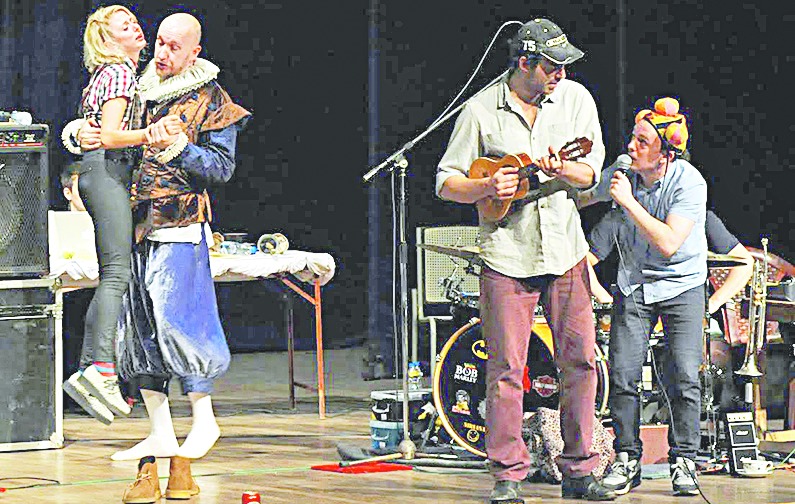
Centre Stage Creations' Sabhagar Theatre Festival, more like a fiesta with so many motley events, showcased two major happenings: Filter Theatre's acclaimed Twelfth Night, brought from London by British Council, and the world premiere of Cinematograph's What Is Done, Is Done (Mumbai troupes normally don't open in Calcutta). Both might have made local Bard-watchers realize that, Shakespeare's classics having passed into popular lore, theatre has the liberty to adapt them just as it does classical myths and legends. The only test it should pass is fidelity to his aims.
Having run for nearly a decade since the Royal Shakespeare Company commissioned it for their Complete Works in 2007, Filter's Twelfth Night definitely had something going. Finally, we got to see why. The director, Sean Holmes, took two keys to unlock the play's treasures. The first lies in the name itself, "Twelfth Night" meaning the Feast of Epiphany that culminated Christmas celebrations, and traditionally associated with saturnalian abandon. Shakespeare himself subtitled it What You Will, the only alternate title he ever gave. Therefore, he encouraged us to make or create what we would of it. Anyone who argues that Filter cut and strayed from the text misses the whole point and actually exposes a Malvolian puritanism. They captured the spirit of revelry marvellously, personified in the drunk Sir Toby, the only one wearing Elizabethan livery, and remembering the wrong lines, from Macbeth and Hamlet.
Holmes's second key, equally obvious, the opening cue: "If music be the food of love, play on,/Give me excess of it". He got the entire team to improvise the drama in terms of live music. The stage didn't look like an artistically designed set, but a messy recording studio, haphazardly littered with cables, instruments, mike stands and Marshall amps, the tables occupied by mixers, Macs and MIDI controllers. Every actor also sang or played; a guitarist and drummer completed the crew. In addition, an innovative soundscape accompanied the dialogue, for instance, conveying the storm inventively by a BBC-like weather report on a portable radio.
Integrating the two keys led to many brilliant scenes. I particularly enjoyed the ten-minute buildup on "What is love?" from an unexpectedly hushed, even unmelodious a cappella duet, climbing steadily as it involved everyone, including spectators enticed into dancing or tossing balls at Sir Andrew's velcro cap (picture). The merry mayhem eventually reached such a crescendo that it seemed only natural for Malvolio to burst in and stop the carnivalesque "caterwauling", as all looked sheepish about their excesses. Equally appropriate was Malvolio's own excess on reading Olivia's purported letter, stripping down to yellow undies and striped socks, and air-guitaring to a thrash-metal riff.
Did Filter skip anything Shakespearean? Yes; the theme of romantic love got swamped under the delightful free-for-all and, inevitably, after rumbustious heights a lull descended in Act 5. But we could even interpret that as a sign of sympathy for the heavy-metal "Count M", hard done by, which Twelfth Night implies. He may be a spoilsport but, after all, he only did his job - impose discipline on anarchy, which we know our own country also needs - and like the others, fell in love. Do these merit such extreme punishment?
Rajat Kapoor's concept of clowns performing Shakespearean tragedy reaches a trilogy on What Is Done, Is Done - a titular slip (Lady Macbeth's iambs go "What's done is done") hinting at directorial slippage, too. If I hadn't seen Cinematograph's Hamlet the Clown Prince and Clown Lear previously, I might have greeted this Macbeth version (a reduced text, like Filter's Twelfth Night) enthusiastically. But their clown method no longer surprises, so the effect can't come close to their Hamlet, though it easily surpasses their solo Lear.
Let me substantiate by an example. Throughout the trilogy, the clowns affect a fake Italo-Iberian accent that has now become predictable. Kapoor should have changed it to inject some originality. In fact, the novelty in this production - two janitors who introduce themselves as the show's producers - charms us much more than the interpretation of Macbeth. Vinay Pathak and, especially funny, Jim Sarbh with his ignorance and vulnerability, pull the carpet from under the Shakespearean characters. I can't understand why Kapoor deleted the Porter, virtually written for his group.
As "Macky B", Ranvir Shorey does comparatively little comically, sticking out like a sore thumb in his mock-seriousness. The three witches also enact Lady Macky, which renders her portrait interesting, though directors worldwide have done this before, physicalizing the connection between her and the forces of darkness. As themselves, the weird sisters chomp on chips, watching the future unfold as if on television. But because so many great moderns have parodied the Scottish play, from Alfred Jarry in Ubu the King to Eugene Ionesco in Macbett, this edition doesn't match up.










